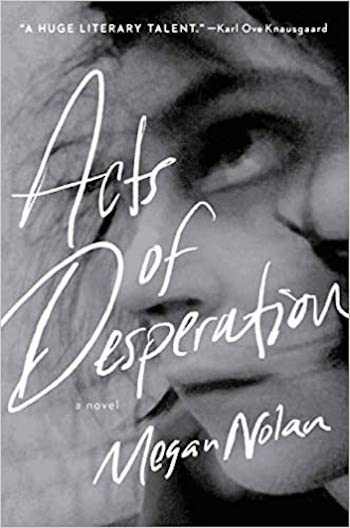Book Review: “Acts of Desperation” — The Ordinary Flip-Flops of Desire
By Drew Hart
This debut novel concentrates on the vagaries of desire, but in a spare, uncomplicated, and natural fashion that sets it apart from any formulaic romance.
Acts of Desperation by Megan Nolan. Little, Brown, 288 pp., $27.
Buy at Bookshop

Earlier this winter — is it almost over? — the New York Times published an eyebrow-raiser of an opinion column entitled “The Joy of Frivolous Sex.” (I know! In the Times!) It was something of a single person’s lamentation over life during the pandemic, focusing on those of us who, living on their own, have been deprived of physical intimacy. The piece was met by an eager crowd of commenters who shared its sentiments, along with some prim and proper folks who didn’t.
After this arresting, and eloquently spoken column, its author, Megan Nolan, a young Irishwoman, may have generated a built-in audience for her first novel, Acts of Desperation. A chronicle of a mostly plain, largely confused, off- and on-again love, as told by a narrator who’s as tormented by her passion as thrilled with it, this debut concentrates on the vagaries of desire with its attendant frustrations. And curiously, it does this in a spare, uncomplicated, and natural fashion that sets it apart from any formulaic romance.
Acts is recounted by a nameless Dublin student who has dropped out of school and has been eking out a living, first as a waitress, then as an office clerk in a dental hospital. She’s often out on the town with her friends after work, usually hungover after the festivities. One evening, attending a gallery showing, she meets a breathtakingly handsome older man she has seen and admired from afar before — a Dane who has moved to Ireland to be closer to his ailing father. Ciaran (a Dane with a Gaelic name?) is an arts critic and unpublished poet of some kind. And he is difficult: often distant, sullen, and inexpressive, sometimes obviously still thinking about a past love he left in Denmark.
But our lass just doesn’t care — love is what matters. She subjugates herself to its call even if it humiliates. Her neediness is more important than anything else, even though her obsessions have in the past led to problems with weight control and mild self-mutilation. “This was why I wanted to be in love… Love itself sustains and validates the rotten moments you would otherwise be wasting while you practise being a person, pacing back and forth in your shitty apartment, holding off till seven to open the wine.” So although the relationship that begins and proceeds is a far cry from perfect, our narrator soldiers on in it over the course of several years.
There’s not much to recount: this couple dates, makes love, goes home. They go for coffee and to see art shows. She endures his neglect. After an uneasy Christmas during which the frosty (highly unlikable, really!) Ciaran goes silent and missing, there’s a breakup. Then there’s a reconciliation — he somewhat inexplicably returns — and suddenly a decision is made to move in together. Yet things remain uneasy, unbalanced; this heroine hides in her brooding thoughts and unrequited feelings; she dwells on her lover’s former girlfriend, looking for traces of her in his phone. (And she does a great deal of drinking… the only expected Irish stereotyping found here.) Moody and introspective, the story ambles around, the two coupling and uncoupling, although sex itself, while frequent, is scarcely detailed, almost chaste? Over time, the relationship may just be wearing out — but process of its waning teaches our narrator to let go of her preoccupations, to stop being in love with love… and certainly to stop being in love with Ciaran. She begins slipping away for one-night stands with former boyfriends and others behind his back. She’s found near its conclusion living in Athens, having broken away, now ignoring the advances of other men.
Acts is entirely simple, but feels universal — somehow charming and pure as a result of heartfelt nature and an authentic voice. The readers of Nolan’s Times column — at least those who praised it — are likely to enjoy it, and perhaps to relate, as will many.
Drew Hart writes from Santa Barbara, California
